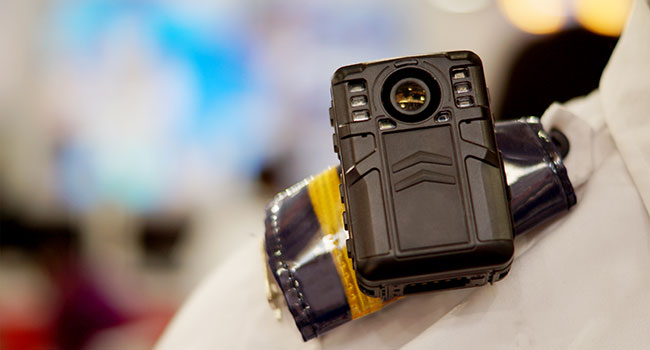
DHS Announces First Department-Wide Policy on Body-Worn Cameras
As required by President Biden’s Executive Order on Advancing Effective, Accountable Policing and Criminal Justice Practices to Enhance Public Trust and Public Safety, Secretary of Homeland Security Alejandro N. Mayorkas recently announced the first Department-wide policy on Body-Worn Cameras (BWCs) for its law enforcement officers and agents. The Department’s plan will include a phased implementation of BWCs while working with Congress to secure the necessary funding to equip agents nationwide with BWCs.
Within 180 days, U.S. Department of Homeland Security (DHS) agencies and offices will draft and issue, or update, their own individual BWC policies that meet or exceed the requirements set forth in the Department-wide policy.
The DHS-wide policy builds on pilots, testing, and phased rollouts at component agencies over the last two years:
- U.S. Customs and Border Protection has already issued 7,000 BWCs to its workforce as part of an Incident-Driven Video Recording Systems program, with a phased deployment that began in August 2021 at Border Patrol locations across the southwest and northern borders, to be followed by select Office of Field Operations Special Response Teams.
- U.S. Immigration and Customs Enforcement conducted a pilot program, beginning with Homeland Security Investigations special agents who are members of the special response teams in Houston and El Paso, Texas; New York City, New York; and Newark, New Jersey, followed by Enforcement and Removal Operations officers in Atlanta, Georgia; Salt Lake City, Utah; and Indianapolis, Indiana.
- The U.S. Secret Service also issued an agency-specific policy in compliance with the Executive Order.
“Our ability to secure the homeland rests on public trust, which is built through accountability, transparency, and effectiveness in our law enforcement practices,” said Secretary Alejandro N. Mayorkas. “Today’s policy announcement is designed to advance these essential values. Requiring the use of body-worn cameras by our law enforcement officers and agents is another important step DHS is making to bring our law enforcement workforce to the forefront of innovation, and to further build public trust and confidence in the thousands of dedicated and professional law enforcement officers at DHS.”
The DHS-wide policy outlines:
Situations for use of BWCs
- Used for law enforcement interaction with the public in response to emergency calls, pre-planned arrests, or during execution of a search or seizure warrant or order.
- Among other restrictions, will not be used for the sole purpose of recording individuals engaged in First Amendment activity.
Agency Requirements
- Within 180 days, DHS agencies and offices will draft and issue, or update, their own individual BWC policies that meet or exceed the requirements set forth in the Department-wide policy, including the responsibilities for law enforcement officers to carry, operate, maintain, and secure BWC equipment.
- Ensure BWC programs are in compliance with privacy policies and that personnel are properly trained in the use of BWCs.
Law Enforcement Officer Responsibilities
- Law enforcement officers are responsible for proper use of BWC equipment, including activation and deactivation, and storage and care of BWC data in their possession.
Although this policy establishes requirements for the use of BWCs, not all DHS law enforcement officers will immediately be issued cameras. Some DHS agencies and offices already have deployed BWCs to its officers and agents; others will begin to employ cameras as funding becomes available. DHS is working to secure the resources required to ensure full implementation of the new policy. Once DHS officers and agents receive BWCs, they will be subject to their Agency’s or Office’s policy.
The policy was developed through DHS’s Law Enforcement Coordination Council, a forum that allows the Department’s nine law enforcement agencies and offices to collaborate on law enforcement issues, with the input of stakeholders across the Department. This included subject matter experts from both the operational law enforcement agencies and DHS headquarters offices such as the Offices of Strategy, Policy, and Plans; Civil Rights and Civil Liberties; General Counsel; Privacy; and Public Affairs.
This new policy brings DHS into alignment with the Department of Justice’s policy on BWCs, released on June 7, 2021.
DHS encompasses nine operational law enforcement agencies with nearly 80,000 law enforcement officers and agents across the country.